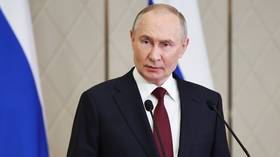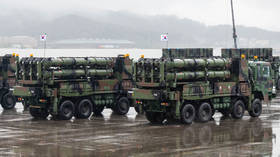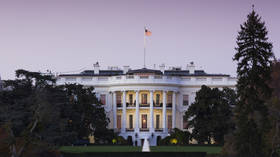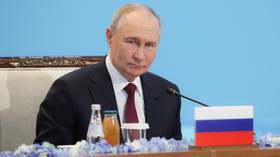‘It will be a challenging year’: Russia’s minister of justice talks to RT about legal battle with ‘Yukos oligarchs’ & 2021 outlook
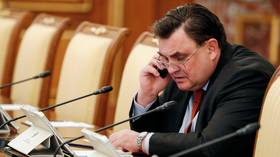
With the case around former oil giant Yukos set to grab headlines, early next year, Russian Minister of Justice Konstantin Chuychenko has explained to RT Moscow's stance on this issue, which is subject to a $50 billion claim.
It's now expected that Russia’s cassation appeal against the ruling of the The Hague Court of Appeals, which has denied its latest motion, will be considered in February 2021 in the Supreme Court of the Netherlands. As well as the battle over Yukos, Minister Chuychenko also explained his official's work with the European Court of Human Rights and other aspects of international cooperation the ministry is engaged in, as well as the planned reform of the Russian penitentiary system.
Q: It’s been almost a year since you were appointed Russia’s minister of justice. 2020 has proved to be a tough year for our planet’s entire population. Now that it is drawing to a close, it’s time to recap. How difficult was the outgoing year for you personally and the institution you represent?
A: In general, I can say that 2020 has been a really complicated year, mainly due to the pandemic. We had to comply with all the restrictions and to change the way the ministry functions. A significant number of our staff has worked from home during this period.
We faced urgent problems and had to come up with solutions to deal with them. It is the first time that the world has faced something like that.
Also on rt.com Former Yeltsin-era oligarch Khodorkovsky denies he admitted guilt to Putin in exchange for 2013 presidential pardonAnd quite often we had to take really important decisions pertaining to the rights and legitimate interests of Russian citizens and organizations. It was not easy.
We worked with other ministries and agencies to find the right solutions, balancing out the interests of various parties. Most importantly, we were trying to balance out the requirements of public safety and the need to protect the rights and legitimate interests of individuals and organizations.
Q: In February 2020, the Appeals Court of the Netherlands delivered its ruling on the legal effort by YUKOS ex-shareholders to collect $57 billion in compensation. Russia’s Ministry of Justice called this decision unfounded. What is Russia’s case for such a statement?
A: The ruling you are talking about was delivered by an appeals court, the Hague Court of Appeal. A first instance court, a Dutch district court, had overturned the ruling by the Arbitration Tribunal which issued damage awards. And the appeals court reversed this first instance decision.
We have filed a cassation appeal against the ruling by the Hague Court of Appeal, which will be considered in early February [2021 – RT]. We expect the decision on our appeal to be delivered by the end of the next year.
Our main argument is that the Arbitration Tribunal had no right to consider this case and to order the Russian Federation to pay damages from its federal budget, because the international treaty, the Energy Charter [based on which the judgement was delivered – RT], had not been ratified by Russia.
Also on rt.com Netherlands rejects Russia’s request to suspend enforcement of record-breaking $50 billion awarded in Yukos caseWe are currently working further on this argument, trying to prove that the Arbitration Tribunal and the Dutch court of appeal have, in fact, undermined the division of powers principle by their rulings: the Energy Charter Treaty clearly states that it is subject to ratification as a statutory requirement. The arbitration award will not be considered binding, unless there is an Act of Parliament [of the Russian Federation – RT] that recognizes the court of arbitration’s jurisdiction.
We believe that this part is in contradiction to Russia’s national law, which stipulates that any claims against the federal budget, the government coffers, can only be ordered by a public court of law.
Also, we are further working on the case against recognizing the ex-shareholders of the oil company YUKOS involved in this case to be investors as defined in the Energy Charter Treaty, because we need to consider the so-called “dirty hands” problem [a term used in political ethics – RT].
The appeals court has rejected the case we presented concerning the “dirty hands” aspect of the investors in question. They told us they could see no connection between the claimants, the titles of these claimants and the claimants themselves, the so-called oligarchs, who are actually behind this case. We are planning to present additional evidence we are currently collecting.
Q: If we take international cooperation and international law, what progress have we made this year?
A: We’re working on strengthening our ties – our bilateral ties, first and foremost, internationally. We have ratified five mutual legal assistance treaties, and are currently working on four more treaties like that. I expect that we’ll present them for ratification soon.
At this point, we’re negotiating with about 30 countries on drafting and then concluding treaties on mutual legal assistance in criminal matters.
We’ve been making steady progress, but of course the pandemic means certain adjustments are in place. It would be nice to move forward faster. I think we’ll get that momentum as soon as the pandemic is over.
Q: In September, you began a selection process to pick a Russian judge for the European Court of Human Rights (ECHR). How was it organized? How many people applied? Do we know the results?
A: The term of the current judge from Russia expires in a year – on January 1, 2022. By that time, a new judge should be elected.
Also on rt.com Moscow claims win after US court rejects oligarchs' demand for seizure of Russian assets in $50bn Yukos legal battleAs you know, there is one judge in respect of each member state in this esteemed organization. We held an open competition.
Thirty-four candidates submitted their applications, but we had to reject several of them based on formal eligibility criteria that some candidates simply didn’t meet.
Then they had to sit for a test organized with the help of Moscow State University of International Relations. The point was to test the candidates’ command of the two working languages [English and French – RT].
Eighteen people advanced to the interview stage. The members of our commission are distinguished professionals, respected both within the government and among academia. Out of those 18, we shortlisted six potential candidates to fill the position of the ECHR judge. We will present the list to the Russian president for consideration.
The president will select three candidates out of those six. Then the Parliamentary Assembly of the Council of Europe will elect one of them to serve as a judge of the ECHR for the next nine years.
Q: What kind of relations does Russia have with the ECHR? Does Russia comply with the rulings issued by international courts? Which cases that involve Russia will ECHR rule on in the near future?
A: I can’t say our interactions are simple and easy. In many cases, we just can’t agree with the rulings, but we’ve improved on the execution of the court’s rulings.
Moreover, we changed Russian laws, allowing our people to go to our national, Russian, courts to file lawsuits seeking damages for emotional or any other distress that stems from failure to ensure adequate conditions in prisons and detention facilities.
Also on rt.com Weaponized courts: The $50 bn Yukos case may be the final straw for Russia, ending its cooperation with Western ‘justice’In the near future, we expect to see rulings[from the ECHR – RT] on Georgia v Russia and Ukraine v Russia. They are very important cases. We’ll keep working on it. It will be a challenging year. Some hearings scheduled for 2020 have been postponed to 2021 because of the pandemic, so our timetable is going to be very busy and demanding.
Q: What improvements have been made to the Russian penal system in 2020? What new bills have been adopted? What has changed?
A: We’ve made some adjustments in terms of our legislation, fine-tuning certain aspects rather than revamping the entire system.
I’d like to emphasize our plans to change the laws in order to ensure that there is no infringement on human dignity. Those who are in prison or detained because they are suspected of perpetrating a crime or convicted by the court are still our people. We need to protect their rights without stripping them of dignity in any way.
Currently we’re working on a framework to further improve our penal system. Our main goal is to make our penal system humane, sensible and efficient, and at the same time fairly cost-effective.
We’ve already made some decisions concerning our legislation. We expect that soon a significant number of people will be transferred from prisons to the so-called correctional labor centers.
Q: What is the purpose of this reform?
A: Presently, Russia is 17th in the world ranking by the number of prisoners per 100,000 [of the national population – RT]. In my view, this isn’t bad. The United States, for instance, ranks third.
But I think we need to keep making progress. We should take some burden off our prisons and shift people (primarily those with minor offences) to other forms of punishment.
We also need to figure out and devise a clear concept of how many correctional facilities we need. We are now working on proposals for establishing institutions as part of the so-called overall plan for developing correctional system facilities. It’s a set of specific design and management decisions on how many places of this type should be created, and what is required for each region.
This way, we’ll be working systematically, and will ensure a more efficient operation of the Federal Penitentiary Service, because today we have facilities with less than 100 prisoners and a larger number of staff working there. In general, I believe that having two or three prisoners per one staff member would be a decent number. Then we could say that this system is reasonable.
As for female prisoners, I think we should reconsider this situation as well. It doesn't even look very natural, especially when women stay in prisons with their children. We need to do something about this – first of all, humanize it, and provide decent detention conditions for them.
The idea is that prevention is very important. Having no backslide is a serious indicator. Namely, people who are not socially dangerous and have not committed serious offenses should be given an opportunity to prepare to go back to a normal life. Our task is to help them get off the crime path and return to living as law-abiding citizens.
Q: A major Russian penal system development program was introduced in 2010, with many different proposals and ideas. As the program ends now, could you tell us what actually got implemented?
A: Unfortunately, not everything has been implemented. We have to admit that, we have to be open about it. There is still a lot to do.
The program was mainly aimed at patching the holes in the system. Our infrastructure is very old, as the wear-and-tear of our main correction facilities today is more than 70 percent.
I believe we should be talking about building new advanced infrastructure that would meet the modern innovative standards.
Moreover, the program should ensure that people serving their sentence would be staying in decent conditions.
So, we are now working on a new concept. The current program ends in 2020. Now it’s time to prepare proposals and design a program for the period up to 2030.
Q: What is the right rehabilitation path for the convicts? What measures should be taken and laws adopted to make sure that, as you’ve said earlier, people would be released with a clear conscience, that they would get decriminalized while still in a facility?
A: This is a very difficult question. I’d say it’s unlikely to reach this goal by passing new legislation, although the legislative component is important.
We will do research to determine whether the punishment and the manner in which it is served matches the degree of the offense. This is a very important job that needs to be done.
I’d say that it’s a package deal of criminal law policy, procedural, and substantive regulation. We do come across quite many instances of injustice and inconsistency, and we will come up with corresponding proposals.
I believe that the entire framework of the penal service should be changed. The new policy should be focused primarily on individuals, their problems and their background. I want to stress once again, these are our citizens, and we must do everything possible to make sure they don’t commit crime again.
Think your friends would be interested? Share this story!


